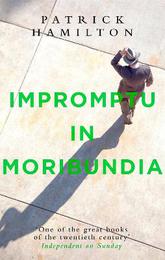
|
Impromptu in Moribundia
Paperback / softback
Main Details
| Title |
Impromptu in Moribundia
|
| Authors and Contributors |
By (author) Patrick Hamilton
|
| Physical Properties |
| Format:Paperback / softback | | Pages:208 | | Dimensions(mm): Height 196,Width 126 |
|
| Category/Genre | Classic fiction (pre c 1945)
Science fiction |
|---|
| ISBN/Barcode |
9780349141626
|
| Classifications | Dewey:823.912 |
|---|
| Audience | |
|---|
|
Publishing Details |
| Publisher |
Little, Brown Book Group
|
| Imprint |
Little, Brown Book Group
|
| Publication Date |
6 December 2018 |
| Publication Country |
United Kingdom
|
Description
'I recommend Hamilton at every opportunity, because he was such a wonderful writer and yet is rather under-read today. All his novels are terrific' Sarah Waters 'If you were looking to fly from Dickens to Martin Amis with just one overnight stop, then Hamilton is your man' Nick Hornby Patrick Hamilton's novels were the inspiration for Matthew Bourne's new dance theatre production, The Midnight Bell. Impromptu in Moribundia is a satirical fable about one (nameless) man's trespass (through a fantastical machine called the 'Asteradio') into a parallel universe on a far-off planet where the 'miserably dull affairs of England' are mirrored and transformed into an apparent idyll of bourgeois English imagination. Moribundia is the 'physical enactment of the stereotypes and myths of English middle-class culture and consciousness.' Yet the narrator comes to discover that he has stumbled among a people characterised by 'cupidity, ignorance, complacence, meanness, ugliness, short-sightedness, cowardice, credulity, hysteria and, when the occasion called for it . . . cruelty and blood-thirstiness.
Author Biography
Patrick Hamilton was one of the most gifted and admired writers of his generation. His plays include Rope (1929), on which the Hitchcock thriller was based, and Gas Light (1939). Among his novels are The Midnight Bell, The Siege of Pleasure, The Plains of Cement, Twenty-thousand Streets Under the Sky, Hangover Square, The Slaves of Solitude and The West Pier. He died in 1962. The Sunday Telegraph said: 'His finest work can easily stand comparison with the best of this more celebrated contempories George Orwell and Graham Greene.'
|